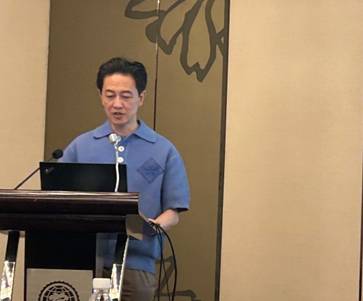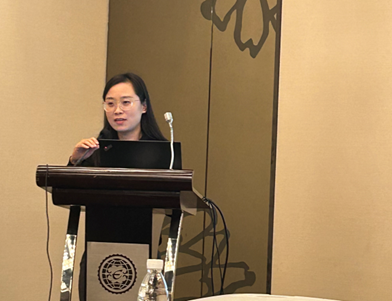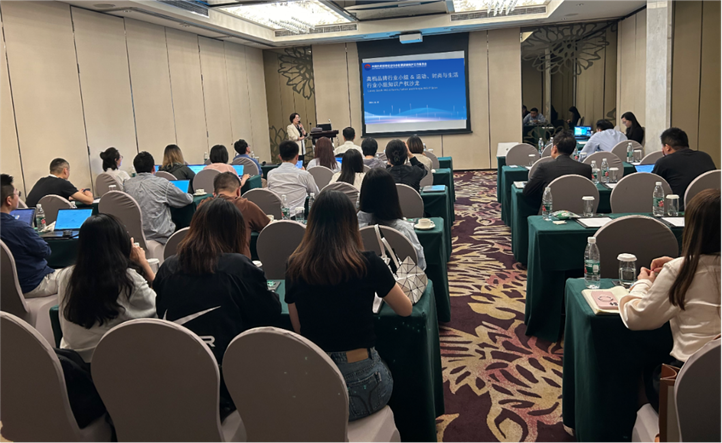On June 18, the Quality Brands Protection Committee of China Association of Enterprises with Foreign Investment (QBPC) Luxury Goods IWG and Sports, Fashion and Lifestyle IWG held the first joint IP Salon this year. The Salon was moderated by Luxury Goods IWG Coordinator Miller Wang and Sports, Fashion and Lifestyle IWG Coordinator Esther Dong. A total of 7 speakers gave lectures, and 68 representatives from 35 member companies attended the event online and offline.
In opening remarks, Miller Wang thanked the members for their enthusiastic participation and briefly reviewed the IWG’s activities in the first half of the year. Meanwhile he also looked forward to more opportunities to share ideas and discuss common issues in coming months. After that Esther Dong introduced the speakers and the main topics.


Jason Yao thoroughly explained the evidence preparation in civil litigation. He summarized the rules and types of evidence in civil litigation and analyzed some important evidence categories in IP infringement litigation. He enumerated the precautions in evidence preparation in respect of evidence classification, especially the sources and ways of obtaining evidence to prove the scale of infringement and the infringement profit. Finally, Jason illustrated the effect of the above-mentioned approaches in judicial practice through several case studies. He stressed that in the follow-up civil proceedings in criminal cases, right holders should make full use of the punitive damages system to seek a higher amount of compensation, so as to achieve the deterrence on future infringement.
Demi Yu introduced how the law enforcement agencies overcame the obstacles in a criminal case in which the infringer didn’t have any account book, the revenue and cost of selling fake products could not be figured out. Based on the principle that if there were any reasonable doubts about the facts, a judgment or ruling should be made in favor of the defendant, the law enforcement agencies calculated the minimum sales of fake goods and the minimum illegal income of the defendant through the rigorous calculation formula, and finally secured conviction and sentencing.
Catherine Law expounded the common forms of modification, the judicial practice of infringement determination of modified products at home and abroad, the elements of infringement and the exhaustion of rights. She shared her ideas and successful experience from the first case of modified watch in Casio which she represented. According to her, in the determination of infringement involving modified goods, the act of resale after substantial modification might be recognized as trademark infringement in principle unless the relevant public had been fully and clearly informed. Generally speaking, it was necessary to firmly grasp the inherent judgment logic of "possibility of confusion" in judging whether the modification was infringing or not.
While addressing how the right holders could effectively leverage the IP border protection measures, Xiaoning Jia briefly introduce his thoughts and key points of customs IP protection law enforcement. Through the interpretation of the discretion benchmark of customs IP administrative penalty cases newly formulated by the General Administration of Customs and case study of IP border protection in the field of cross-border e-commerce, he suggested the right holders should pay special attention to the new trends in law enforcement and related legal issues.
Frances Tang described the recent problems of fake purchasing agents and the inaccurate test results of third-party inspection institutions. In a recent case of fake purchasing agents, the right holders had cracked the actual relationship between many online stores with the same business model through a large number of test-buy procedures, then traced back to the source of counterfeiting with the investigation of the public security organs. She also shared the recent accidental discovery of the problems of unclear test standards and inaccurate test results in the third-party luxury inspection institutions, which should draw attention from IWG members.
Niklas Fu then discussed the fake authorization in virtual and physical world. He first analyzed the status quo of fake authorization cases and the problems, illustrated the types of fake authorizations online, as well as listing the horrifying offline fake authorization cases, introduced the situation that infringement offenders registered copycat companies in advance to confuse attention and modified contact information on third-party software to create fake official repair centers. He also summarized the characteristics of fake authorization and proposed three countermeasures, including improving internal collaboration among industry players, strengthening cooperation with platforms and enhancing the communication on relevant cases.
James Luo then shared the latest cases on IPR. He gave the detailed discussion on how to obtain high punitive damages, especially the specific considerations including relevant laws and regulations, determination of seriousness of the circumstances, the bases of punitive damages, calculation on the profits of the infringer due to the infringement, unit profits, reasonable license fees, the ratio between punitive damages and compensory damages, etc. While determining the compensation base, it should be considered that different IPR had different contributions to different products.
In the end, two IWG Coordinators thanked the speakers again for their wonderful sharing and QBPC members for their enthusiastic participation. They hoped that two IWG members could strengthen communication, discuss issues of common concern, join hands to tackle the problems, and looked forward to the next meeting.

